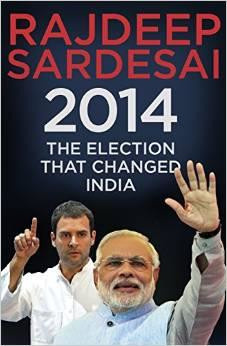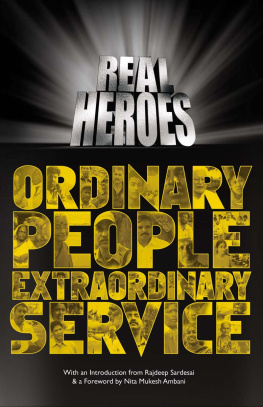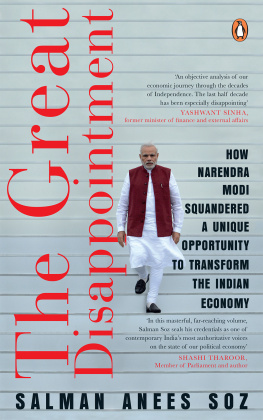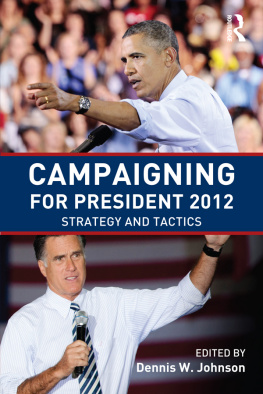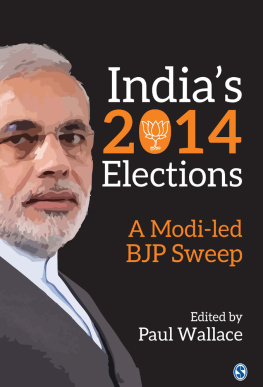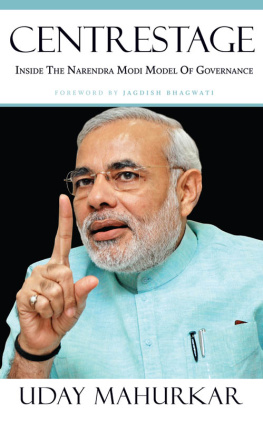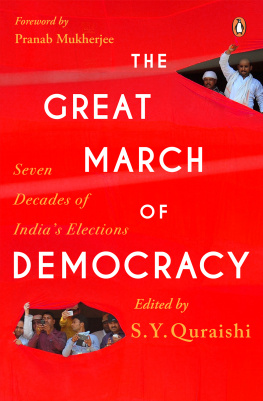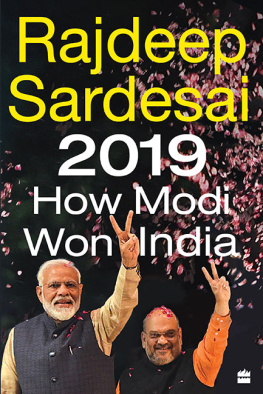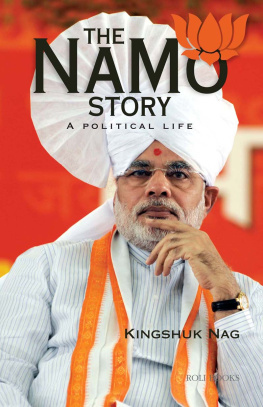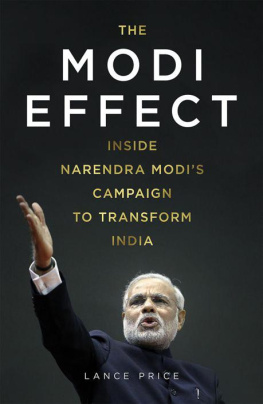Rajdeep Sardesai 2014 The Election That Changed India Contents Dedication Introduction 1. Narendrabhai, the Man from Gujarat 2. Prisoner of a Family Legacy 3. A Government in ICU 4. I Want to Be Prime Minister 5. Battle for the Heartland 6.
Kings, Queens and X Factors 7. Multimedia Is the Message 8. The Making of a Wave 9. The Big Fight: Amethi and Varanasi 10. Its a Tsunami! Epilogue Appendix 1 Appendix 2 Appendix 3 Acknowledgements Follow Penguin Copyright To Sagarika, for keeping the faith Introduction On a hot, steamy day on the campaign trail in Varanasi, I was given another reminder of the enduring attraction of an Indian election. Stopping for a cool drink at the citys famous Pehelwan Lassi shop, we asked the owner whom he was going to vote for.
Twirling his luxuriant moustache, Pehelwan Chacha looked at us. Jo Baba Jagannath aur dil kahe! (Whatever God and my heart tell me.) I tried to press him further Narendra Modi or Arvind Kejriwal? As he lovingly laced the lassi with sinful dollops of rabri, he shot back, Dekhiye, sir, vote hamara hai, aap ko kyon batayein? (The vote is mine, why should I tell you?) For more than five decades now, millions of Indians like Pehelwan Chacha have lined up across the country to exercise their franchise with hope and resolve. It is the one day when the gap between the khaas aadmi and the aam aadmi, between the lal-batti car and the auto rickshaw, between a Forbes billionaire and a BPL family, dissolves. We all stand in line waiting to have our fingers inked. If someone tries to break the queue as actor-MP Chiranjeevi tried to in Hyderabad this timeyou can find your voice and ask them to get back in line. It is a truism that the higher income groups in India tend to vote less than the poorthe quest for equality is a constant motivator for the have-nots.
Georgina from north Bengal, mainstay of our household for two decades, had never voted in her life and didnt have a voter card for the Delhi assembly elections. When we finally managed to get her one before the 2014 elections she was overjoyed. On voting day, she just couldnt stop smiling, showing her finger to anyone who would care to see. Her twinkling eyes reflected a sense of feeling genuinely empowered. Sir, hamne bhi vote daala (I voted too), she reported to me triumphantly. I n India After Gandhi, historian Ramachandra Guha suggests that the first election in 1952 was an article of faith for our Constitution makers.
The first election commissioner, Sukumar Sen, described it as the biggest experiment in democracy in human history. A Chennai editor was less kind: a very large majority will exercise their votes for the first time; not many know what the vote is, why they should vote and for whom they should vote; no wonder the whole adventure is rated as the biggest gamble in history. Sixty-two years later, we can proudly say the faith has triumphed; the experiment has succeeded; the gamble was well worth it. The 2014 elections, in a sense, were a reaffirmation of the process that started in 1952. More than 550 million Indians voted in these elections, larger than the entire population of the worlds oldest democracy, the United States. I shall never forget what a Pakistani friend once told me.
In Pakistan, when we want to change the government, we bring in the army; in India, you just use the ballot box. Indeed, we do. Each of the sixteen general elections in this country has been special, though some are more significant than others. The first election was obviously a landmark onea leap in the dark for a country that many western commentators were convinced would rapidly disintegrate. Nineteen seventy-seven was a historic election as wellin the aftermath of the Emergency, it restored public confidence in democracy and was a resounding rejection of creeping dictatorship. I was just twelve years old at the time, but I do remember reading the bold headlines: Indira Gandhi is defeated by the people of India.
I am sure it must have been a remarkable election to track as a journalistjust imagine profiling Raj Narain after he had defeated Indira. I would rank 2014 in the same league as 1952 and 1977. Having had a privileged ringside view of Indian elections as a journalist since 1989, I do believe that the sixteenth general elections mark a tectonic shift in Indian politics. It has been, and I use the word judiciously, a political tsunami (or tsuNamo). Its a term that was first used by the key BJP strategist Amit Shah to suggest that this was more than just a wave electionit was something bigger, much bigger. Tsunami in India is associated with the terrible disaster that hit the southern coast of the country in December 2004, spreading death and destruction.
This election did not result in deaths, but it did destroy certain rigidly held beliefs about politics in this country. It was the death in a way of long-held orthodoxies about voting patterns. The death of a conventional ruralurban divide, of traditional caste and regional loyalties, of family ties, of paternalistic governance, maybe even of the Nehruvian consensus that had dominated Indian politics for decades. To quote Guha from a column written a day after the verdict: The sometimes noble, sometimes ignoble, structure of renown erected by Motilal Nehru and his descendants is now merely a heap of rubble. Stereotypes of which social groups voted for the Congress, which for the Bharatiya Janata Party and which for caste-based parties have been demolished. The political earth of India shook, moving the centre of gravity of an Indian election from identity politics to aspirational politics.
Its a new plus factor that now gets you the crucial additional support, beyond narrow appeals to caste and community vote banks. Election 2014 saw a shift in outcomes, processes and personalities. The outcome itself was staggering. The BJP became the first non-Congress party to win a clear majority on its own (the Janata Party in 1977 was a collection of several parties). In its original avatar as the Jana Sangh, the party had won just three seats and 3.1 per cent of the vote in the 1952 election. Now, it has won 282 seats and 31 per cent of the national voteastonishing figures when you consider that the BJPs catchment area of winnable seats was less than 350 seats.
The lotus has truly bloomed and come a very long way from the time when it was pigeonholed as a BrahminBania party. In six states, the BJP won each and every seat on offer. Its strike rate across north and west India was over 80 per cent, with the party winning more than four of every five seats it contested in this belt. It is in Uttar Pradesh and Bihartwo states that we believed were locked into an enduring caste matrixthat the BJP achieved some of its more dramatic results. Almost every community, except the Muslims, voted overwhelmingly for the BJP. Not only was there strong upper-caste consolidation, even Other Backward Castes (OBCs), Dalits and tribals voted for the BJP in large numbers.
The BJP was, at least in 2014, the new rainbow coalition. In contrast, the 129-year-old Congress party, with its roots in the freedom movement, has been decimated, its monopoly over power challenged like never before. Even in the 1977 elections, the party at least managed to save face south of the Vindhyas. This time, Kerala is the only state where the Congress won more than ten seats. Its final tally of forty-four seats and just 19.3 per cent of the votethe first time its percentage slipped below 20represents a critical inflexion point in its history. The Congress performance has also been the subject of rather cruel jokes.
Returning on a flight to Delhi in June, my co-passenger said, Looks like the national capitals temperature will soon be more than the seats the Congress has in the Lok Sabha! But its not just the final result that made this 2014 election so distinctive. The election has unleashed a chain of processeslatent and overt that could change the way elections are fought in the future. Never before has so much money been spent in fighting an Indian election inflation doesnt just affect the price of tomatoes, it also influences the cost of an election. The BJP, bolstered by unflinching corporate support, easily outspent its rivals, but the more worrisome aspect is just the quantum of money that is now needed by every member of Parliament to win an election. Because, with every rupee donated, the IOUs need to be encashed post-election. A candidate in Andhra Pradesh admitted to me that he needed at least Rs 15 to 20 crore to just stay in the fight.
Next page
